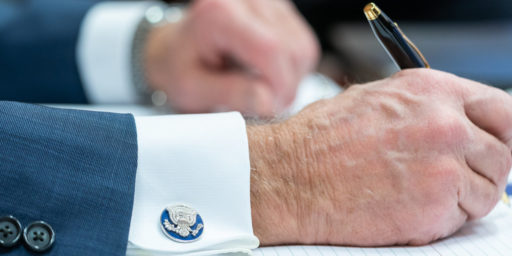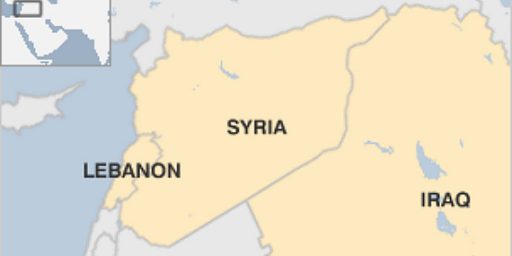Iraq War Radicalizing Lebanon?
Anthony Shadid has a long feature on A1 of today’s WaPo, “Smoke of Iraq War ‘Drifting Over Lebanon’.” It’s an interesting but anecdotal account of how the American invasion of Iraq has radialized the country and helping spread the jihadist fever.
The war in Iraq has generated some of the most startling images in the Middle East today: a dictator’s fall, elections in defiance of insurgent threats and carnage on a scale rarely witnessed. Less visibly, though, the war is building a profound legacy across the Arab world: fear and suspicion over Iraq’s repercussions, a generation that casts the Bush administration’s policy as an unquestioned war on Islam, and a subterranean reserve of men who, like Abu Haritha, declare that the fight against the United States in Iraq is a model for the future.
Through interviews with the would-be insurgents, Shadid paints the picture of a large cohort of people ready to take up arms in the jihadi struggle. As Cori Dauber quite reasonably points out, though,
as far as their numbers, strength, power are concerned, why in the world should Shadid — or we — take [the radicals’] word for it? Shadid does yeoman’s work reporting on what they have to say, but where are the confirmations from experts, from independent politicians, from journalists in the area, from anyone who doesn’t have a vested interest in pumping up the perception of these guys as big as life and twice as ugly? What insurance is there, in other words, that Shadid isn’t being fed a huge pile of propaganda?
Not much. Indeed, unless Shadid is a total ignoramus in Lebanese history, I would say it’s a rather safe bet he’s a willing participant in this proganda. That the war has had an impact across the Arab world is certainly true. Of course, the impact has not been unidirectional, either, with substantial progress made on the diplomatic front in Libya, Jordan, Syria, and elsewhere at least partly in the shadow of Iraq.
Indeed, even in Lebanon, last year’s “Cedar Revolution” was mostly a good outcome and at least tangentially inspired by Saddam’s fall and the push for Arab democracy that followed. David Ignatius repored during its days:
The leader of this Lebanese intifada is Walid Jumblatt, the patriarch of the Druze Muslim community and, until recently, a man who accommodated Syria’s occupation. But something snapped for Jumblatt last year, when the Syrians overruled the Lebanese constitution and forced the reelection of their front man in Lebanon, President Emile Lahoud. The old slogans about Arab nationalism turned to ashes in Jumblatt’s mouth, and he and Hariri openly began to defy Damascus.
[…]
Jumblatt dresses like an ex-hippie, in jeans and loafers, but he maintains the exquisite manners of a Lebanese aristocrat. Over the years, I’ve often heard him denouncing the United States and Israel, but these days, in the aftermath of Hariri’s death, he’s sounding almost like a neoconservative. He says he’s determined to defy the Syrians until their troops leave Lebanon and the Lahoud government is replaced.
“It’s strange for me to say it, but this process of change has started because of the American invasion of Iraq,” explains Jumblatt. “I was cynical about Iraq. But when I saw the Iraqi people voting three weeks ago, 8 million of them, it was the start of a new Arab world.” Jumblatt says this spark of democratic revolt is spreading. “The Syrian people, the Egyptian people, all say that something is changing. The Berlin Wall has fallen. We can see it.”
Surely, helping inspire a democratic revolution at least somewhat balances the fact that some number of Islamist radicals are now even more motivated?
Shadid continues:
Grievances against the United States are nothing new in a city like Tripoli. For a generation, activists across the spectrum have bitterly criticized U.S. policy. What has shifted in the aftermath of the Sept. 11, 2001, attacks and the U.S. invasion of Iraq is the perception of that policy. The critique is no longer about perceived double standards — of excessive support for Israel, of backing Arab dictatorships. Today, it is more generalized, universal and uncompromising. Popular sentiment here and elsewhere holds that U.S. policy amounts to a war on Islam, and in the language of Abu Haritha and others, the conflict is framed as one between the faithful and infidels, justice and injustice.
“The targeting of Iraq can be considered the first step in targeting the entire Middle East to impose a new order in the region,” said Fathi Yakan, a founder of the Islamic Association and head of an umbrella group known as the Islamic Action Forces.
In a waiting room decorated with religious banners is a magazine that celebrates the defiance of the Palestinian group Hamas against attempts to isolate it. “We starve, but we don’t kneel,” says one passage. At the entrance is a poster marking the anniversary of Israel’s assassination in 2004 of Sheik Ahmed Yassin, a co-founder of Hamas. “Together we resist,” it reads. On a street outside, a poster announces a forum titled, “The global campaign to resist aggression on the Muslim nation.”
“Tripoli resembles Fallujah, in everything,” said Yakan, 73.
Not hardly. Indeed, Lebanon is a complicated melting pot demographically:
Muslim 59.7% (Shi’a, Sunni, Druze, Isma’ilite, Alawite or Nusayri), Christian 39% (Maronite Catholic, Greek Orthodox, Melkite Catholic, Armenian Orthodox, Syrian Catholic, Armenian Catholic, Syrian Orthodox, Roman Catholic, Chaldean, Assyrian, Copt, Protestant), other 1.3%
This is hardly a mostly Islamist society. While Hezbollah won a few seats in local strongholds, the coalition government elected last summer is quite moderate and the radicals comprise the main opposition.
None of this is to say that a tiny minority of radical jihadis willing to join the fight, with a larger minority lending them moral support, is something to ignore. Obviously, the war can never be won so long as large numbers of angry young Muslim men are being generated. But front page “news” accounts in major papers giving only the enemy’s side are dishonest and incredibly misleading.





I’m eagerly awaiting Michael Totten’s takedown of this article.
‘unless Shadid is a total ignoramus in Lebanese history, I would say itâ??s a rather safe bet heâ??s a willing participant in this proganda. ‘
willing? Try enthusiastic or even exuberant participant.